If a piece of theatre is supposed to leave you satisfied, then Theatr Pena’s Woman of Flowers is a failure. If it leaves you with a gnawing hunger to watch the show again, to read the text and explore the culture it has arisen from then it is a success. If it also leaves the audience spellbound by the quality of acting, the depth of interpretation, the mellifluous melding of video, music from Peter Knight and performance, it rises to a significant as well as enjoyable one hour and twenty minutes of uplifting theatre.
It is hard work for the audience, but work of the most rewarding kind, concentrating intensely on every word in this dense script, delivered with style, passion and elegance but requiring a focus as sharp as its delivery.
Rhys Meredith and Sara Groegory
Sion Eirian takes the work of Saunders Lewis and also returns to the Mabinogi and crafts his own piece of poetic drama, making changes and adaptations, cutting and grafting, to deliver this latest addition to the genre and the literature of Wales. It is pointless trying here to summarise the plot which in its simplest is the tale of rivalries in the pre Anglo-French conquest of the Welsh kingdoms, told through oral traditions and legends that predate written Welsh and most other languages. The stories are universal, as all lasting stories, are; love, lust, honour, strength, weakness, guilt, vengeance, civilisation and the noble savage, nature and nurture, childhood, parenthood, sibling rivalry, birth, death, the cycle of life, the natural world, the man-made, the human and the animal, superstition, fate, man-made fate, gender, identity, trust, loyalty, the environment…the list goes on. Yes, this is just an 80 minute piece of theatre.
All of this is achieved without recourse to glib updating, soap opera style acting, stereotyping to take short hand with our own referencing, transposition to make quick and easy contemporary links. No, it is performed in exquisite costumes that stay honest to the period of its setting, the video work is of the natural world with just reference to perhaps late Dark ages/ early medieval architecture, the prose refrains from playing down to an audience-rather it raises us up to want to perhaps shake off some of the detritus of the poorer examples of contemporary writing to start enjoying again the written and spoken word. Of course both have their place and there are excellent examples of writing for the TV/ internet attention span audience. But this time let us hear it for those who craft fine words not clatter out cliché.
Rhys Meredith, Sara Gregory and Betsan Llwyd
Movement choreographed by Caroline Lamb, Sara Gregory is Blodeuwedd, created from nature, she moves like nature, pure and unblemished by artifice and convention and so uncontrolled and uncontrollable, as black as she is white, as destructive as she is creative. The acting is as disturbing and appealing as this character. In the same impossibly complicated and irreconcilable way, the Gwydion from Eiry Thomas, defies a type. Gender, genre, nature and incarnation are fluid and motivation as multi-layered and multi-faceted. Again the character’s movements are as integral to the performance as the often hideous words she speaks but underneath she / he / it too is a victim and beyond our judgement. Then we have the scalpel sharp delivery from Betsan Llwyd as Arianrhod. She is the most obviously sympathetic character, having been raped by her siblings, cast or self-cast into a world of isolation, of hatred and vengeance but of caring for the damaged, the weak and the vulnerable. She is the ultimate “winner” but at what cost. The role is defined by this actress with gravitas and pride, unbowed but clearly destroyed. Her strength has to be in the delivery of her word rather than gesture, movement, hyperbole (either physical or vocal). Olwen Rees as the loyal hand maiden Rhagnell has a difficult character to portray as she is on one level the most “normal” person but one put in impossible positions. Ultimately as such she cannot come to terms with what she is having to do, to be and ultimately face.
Betsan Llwyd
Olwen Rees and Sara Gregory
Oliver Morgan-Thomas
The two men in the work are the least satisfactory characters, not in their acting, but in their drawing and lacking in as much depth. As Llew, the offspring of the rape, he is first portrayed as another victim, a figure for our pity, a rather pathetic, cursed child, who thinks he will escape his fate. Oliver Morgan-Thomas did not fill me with conviction but then, when his character transforms, so too did his acting and depth of communicating the role. Hmm. I need to look at this performance again. Rhys Meredith as Gronw, who is captivated by lust for Blodeuwedd and seemingly entranced into killing for love not power similarly transforms. But then does he? He repeats back to Blodeuwedd that it has also taken her some time to understand what he is saying (the necessity for death). The tall and striking actor is the perfect dramatic foil for the young and slightly simpering Llew which, of course, makes the reversal of their position as the plot reached that ugly denouement all the more effective.
Holly McCarthy again designs with a combination of restraint and precision that is fused with the work of Kay Haynes in lighting design and Ceri James’s video editing. Holly McCarthy’s costumes are particularly worth note, particularly for the siblings Arianrhod and Gwydion which tell us of their characters one of level but also introduce into this otherworld of human and animal, of fantastic creatures and symbolism.
Who needs Harry Potter?
Olwen Rees and Sara Gregory
Some may have concerns with some of the dramatic licences taken, some may not agree with the conclusion which, totally contradicting myself, does smack a little of a 21st century amorality play ending. In some ways it also reminded me of David Pountney’s approaches to women, the cycle of life, of morality and sexuality in his productions of Lulu and then Pelleas et Melissande at Welsh National Opera. Here in the hands of artistic director Erica Eirian it was handled with possibly even more sensuality and sexuality while even being able to subtly yet powerfully exploring animality. This is a director at one with her subject, her craft, her creative team and, most importantly, cast.
Tour includes Torch Theatre Milford Haven, Theatr Mwldan Cardigan, Garth Olwg Centre Church Village, Blackwood Miners Institute, Riverfront Theatre Newport, Royal Welsh College of Music and Drama Cardiff , Theatr Brycheiniog Brecon, Theatr Clwyd Mold, Aberystwyth Arts Centre, Lyric Carmarthen, Hafren Newtown, Neuadd Dwyfor Pwllheli, Galeri Caernarfon.
Co-production with Taliesin Arts Centre
Full tour details:
http://theatrpena.co.uk/woman-of-flowers/
Reviewer supported by Wales Critics Fund
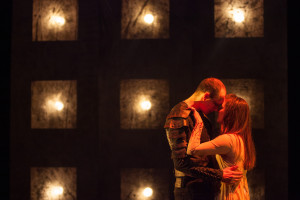

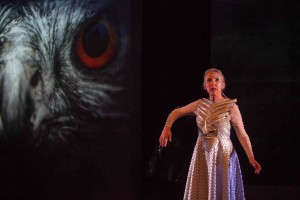
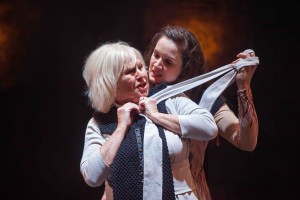
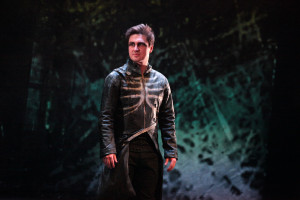
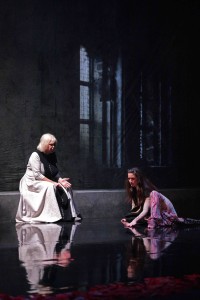
Thank you!
Yes, that is a good review. Llew and Gronw were not easy to read stereotypical masculine characters. Their indeterminate, slightly unfinishedness lent a certain inconclusiveness to the drama that echoes the flavour of the original story. As you say the word craft was excellent with interesting inventions like Llew’s death scene which brought into focus the wren killing story as an action that brought with it a curse that coincided with his fate but stood as an action of his freewill whereby his name was drawn from a thoughtless act that had consequences that his upbringing by Gwydion had left him culturally ignorant of. Malisons malisons mair than ten
That harry the lady of heaven’s hen
The cardigan turnout of 47 people was rather disappointing and I wondered if the Welsh speaking intelligentsia of the area had stayed away due to the play being an icon of Welsh language drama. Perhaps there could have been more effort to make it bilingual or have some shows in Welsh?